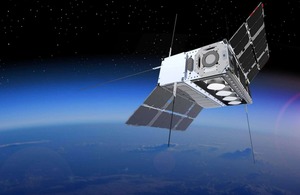
A satellite developed by UK-based company Horizon Technologies is on track for launch in mid-2025, according to an announcement by the UK Space Agency.
The Amber-2 Maritime Domain Awareness (MDA) satellite has successfully completed its Critical Design Review (CDR), marking a significant milestone in its development. This satellite will play a crucial role in detecting "dark vessels" — ships engaged in illegal activities such as human trafficking, illegal fishing, drug smuggling, and sanction evasion.
The project is backed by a £1.2 million investment from the UK Space Agency. Amber-2 is part of the broader Amber™ Programme, which is designed to meet the Royal Navy’s MDA requirements through the Joint Maritime Security Centre (JMSC) in Portsmouth.
In addition to Amber-2, work is progressing on the follow-up satellite, Amber-3. Horizon Technologies is currently inviting proposals from spacecraft suppliers for Amber-3, aiming for a launch in late 2025.
Amber™ satellites detect radio frequency (RF) signals to track vessels, even when their Automatic Identification Systems (AIS) are turned off. This capability has proven particularly effective in identifying vessels involved in illicit activities. Over the past year, several governments have successfully tested Horizon Technologies’ Amber Signal Acquisition System.
Horizon Technologies also offers a land-based variant, AmberPersistent, which collects RF signals over an area up to 3 million square kilometers with real-time, 24/7 coverage. This system has garnered significant orders from both NATO and non-NATO governments in recent months.
Matt Archer, Director of Launch at the UK Space Agency, praised the progress of Amber-2, stating, «The successful progress of the Amber-2 satellite by Horizon Technologies demonstrates the UK’s leadership in advancing space-based solutions for global maritime security. By detecting hard-to-track vessels, Amber-2 will play a pivotal role in safeguarding international waters from illegal activities."
Space-based RF collection is especially useful for detecting vessels in open-ocean environments, while shore-based systems can monitor signals up to 1,000 km from the coast, providing persistent, real-time coverage within a country’s Exclusive Economic Zones (EEZs).
Horizon Technologies CEO John Beckner stated: “The RF Earth Observation market is developing in a path analogous to AIS tracking. The RF signals collection market will likely be a combination of terrestrial systems and space-based data. All you need is a secure coastal site, power, and an internet connection”.
Horizon Technologies, based in Reading, Berkshire, is a global leader in innovative signals intelligence and space-based MDA solutions.


































